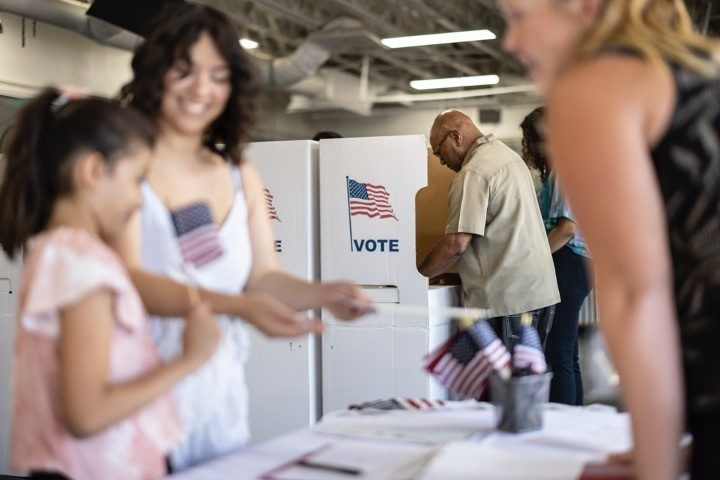
“I consider it completely unimportant who in the party will vote, or how; but what is extraordinarily important is this — who will count the votes, and how.” — Joseph Stalin
As a native of Arkansas, I was asked by several liberty-minded Arkansans to return to my home state and help them defeat the deceptively named “Religious Freedom Amendment.”
The amendment was a ballot measure and, if passed, would have ceded to the state government the authority to suspend religious worship of any kind if it — the state government — declared that there was a “compelling government interest.”
As the constitution of the state of Arkansas stands, government is absolutely forbidden from infringing whatsoever on the right of citizens of the Natural State to worship according to the dictates of their consciences.
Obviously, the current constitutional provision is much more pro-religious worship and anti-government interference than the proposed amendment.
Thanks to God and to the efforts of many hard-working, liberty-minded men and women in Arkansas, the amendment was narrowly defeated and the constitution of that state will remain unchanged.
While this may be slightly interesting to readers, I’m only using this brief recap of the results of the recent decision to introduce something very sinister that I discovered as I sat up Tuesday night and into the dawn on Wednesday, constantly refreshing the official election site of the secretary of state of Arkansas to see if our efforts to protect the freedom of religion were successful.
As I scrolled down the site, I could not believe the notice I read at the bottom of the page. And, remember, this is the official election-results page of the state of Arkansas.
There at the foot of the page I read the following notice: copyright Scytl US.
I immediately scrolled back to the top of the page to make sure I hadn’t accidentally left the official page. I found that I had not, and that I was reading results that were tabulated and owned by Scytl.
Most of you have never heard of Scytl and are probably wondering why I’m making such a big deal about the fact that the company not only was hired by the government of the state of Arkansas to count the ballots, but holds the copyright to the report of the results published there on the state’s official election result website.
Allow me to introduce you to some disturbing facts about Scytl, as first revealed by The New American back in 2013:
First, consider this press release issued jointly by Scytl and the state of Florida after the latter hired the former to count votes:
Scytl’s end-to-end election modernization solution covers the full election cycle (Pre-election, Election Day and Post-election), providing electoral bodies the most secure, transparent, auditable and accessible solution in the marketplace and allows Scytl to offer personalized election modernization roadmaps to their customers combining both traditional and online voting solutions as needed.
The press release bore the dateline Barcelona, Spain and Tampa, USA.
Again, that may seem a bit strange to some of you, but you’re likely not convinced that there’s much controversy in contracting a Spanish company to count votes. I know two words that will change your mind: George Soros.
In order to consolidate such beginning-to-end control, Scytl has purchased software from a trio of organizations within the gravitational pull of planet Soros.
Again, from the press release:
Scytl, the worldwide leader in secure online voting and election modernization, continues receiving electoral and industry expert recognition for its end-to-end election modernization technology and electoral roadmap implementation approach from organizations such as IDC, Ovum and ACEEEO.
Regarding the benefit of its cooperation with Ovum (which is now a part of global research company Omdia), Scytl wrote:
“We believe Scytl’s wide variety of offerings, investment into certifications, and emphasis on security, auditing, and testing position the company as a dominant provider in election modernization,” says Nishant Shah, Research Analyst at Ovum and author of the On the Radar: Scytl report.
In light of his influence on the machines being used to count votes in American elections, Nishant Shah’s biographical sketch that appeared on the Ovum website in 2013 is worth noting:
Before joining Ovum, Nishant’s work spanned organizational strategy, project management, sustainability, and business development. This included facilitating large-scale public-private partnerships in international health for Ambassador Richard Holbrooke and his Global Business Coalition….
That snippet contains several red flags. First, there is Shah’s facilitation of “large-scale public-private partnerships,” or PPPs.
A PPP is often defined as “a contract between a public sector authority and a private party, in which the private party provides a public service or project and assumes substantial financial, technical and operational risk in the project.” As part of this scheme, a private company is given control over some public function typically provided by government. It is a tactic very much in vogue in internationalist circles and is considered an effective way to sneak the influence and control of the United Nations in through the back door.
Regardless of the rhetoric, the true purpose of PPPs is to consolidate government and private corporations, giving them joint control over public entities. The result is the elimination of local sovereignty and the insidious replacement of county election commissions with a board of directors of a company whose mission statement calls for the creation of an executive governing body that is neither fish nor fowl, but is obliged to enforce international treaties and regulations written by the apparatchiks at the UN.
Given the UN’s role in promoting PPPs, it is likely that those administering these centralized partnerships will come from a coterie of managers accustomed to looking to the international body or federal agencies for guidance, if recent initiatives such as Agenda 21/Agenda 2030 are any example.
As envisioned by the UN and the internationalists in the U.S. government, PPPs will slyly seize control of elections, transferring authority for this vital expression of republican government from local and state boards to pseudo-private agencies made up of a mishmash of federal agents and bureaucratic overseers adhering to global government regulations.
The second warning bell that sounds in Shah’s biography is his affiliation with the Global Business Coalition.
George Soros is a “founding supporter” of the Global Business Coalition.
And there is yet another Shah-Soros connection.
Later in Shah’s Ovum bio, his work with the Acumen Fund in Pakistan is noted. Soros’ daughter, Andrea, serves on the board of this organization. She also sits on the board of her father’s Open Society Foundations.
Following the dotted lines connecting the Open Society Foundations to Scytl and on to Soros is a bit of a challenge, but one worth accepting. In a 2013 article published on WorldNetDaily, Aaron Klein ably guided readers from strand to strand in this web of influence.
Scytl purchased the software division of Gov2U, described as a nonprofit organization dedicated to developing and promoting the use of technology in the fields of governance and democracy.
A Scytl press release said: “Gov2U created its software division in 2004 and, since then, it has developed a wide array of innovative award-winning eDemocracy solutions that have been implemented in multiple countries across Europe, Africa and America at the local, regional and federal government levels.”
The Spain-based company says the “main purpose of these tools is to engage citizens in participatory processes through the use of online and offline platforms, bringing more transparency and legitimacy to decision-making processes.”
[In 2013, Gov2U was] partnered with Soros’ Open Society to support and develop a group called the Declaration on Parliamentary Openness.
The group runs a website, OpeningParliament.org, which says it is a forum “intended to help connect the world’s civic organizations engaged in monitoring, supporting and opening up their countries’ parliaments and legislative institutions.”
[Gov2U], meanwhile, has eight partners of its own listed on its website, including the Soros-funded and partnered National Democratic Institute, or NDI.
Aside from receiving financial support for Soros, NDI has co-hosted scores of events along with Soros’ Open Society. The two groups work closely together.
NDI and the Open Society, for example, worked together to push for electoral and legislative reform in Romania.
NDI boasts that with Open Society Institute funds it conducted a political leadership training series for Romanian activists to “bring tangible improvements to their communities.”
NDI describes itself as a nonprofit, nonpartisan, nongovernmental organization working to establish and strengthen political and civic organizations, safeguard elections and promote citizen participation, openness and accountability in government.
NDI previously stated it was founded to draw on the traditions of the U.S. Democratic Party.
WND found that NDI is also listed as the only U.S.-associated organization of Socialists International, the world’s largest socialist umbrella group.
NDI was originally created by the federally funded National Endowment for Democracy, or NED, which itself founded joint NDI projects with the Open Society. Another NDI financial backer is the United States Agency for International Development, USAID.
It is disturbing to discover that not only is Scytl found in the Soros sphere, but it has demonstrable connections to international socialism, the U.S. Democratic Party, and the United Nations, as well.
Taken alone, these unsettling associations might make voters question their electoral board’s contracting with Scytl to administer elections in the United States. When viewed in context of the spread of Scytl’s support of vote counting, however, the picture takes on an even darker aspect.
Voter Action, an election integrity advocacy group, filed a complaint with the U.S. Election Assistance Commission in April 2010 alleging that the use of Scytl’s systems in the voting process raised “national security concerns.”
“Foreign governments may also seek to undermine the national security interests of the United States, either directly or through other organizations,” the complaint claimed.
In support of this last assertion, the complaint revealed that Scytl was formed in 2001 as the result of work done by a research group at the Universitat Autonoma de Barcelona, work that was financed in large part by the Spanish government’s Ministry of Science and Technology.
In light of the foregoing, the identification of those with ownership and control of the company that counted (and owns the results of that count) millions of votes in the midterms and that will be counting the votes for president (and other government officers) in 2024 is crucial to the protection of the sanctity of the election process.
Such associations are certainly worth examining very closely before control of our elections is handed over to Scytl, especially in light of Scytl’s practice of downloading the votes from each precinct where its devices are in use to a company-owned server where they will be stored. Once the votes are collected, counted, and collated by Scytl and saved on its own proprietary servers, it would be nearly impossible to track any discrepancies between the numbers it reports and the actual vote tallies as taken at the local polling places.
While the ties that bind the two major political parties to the foreign corporation that will be managing the counting of votes in many parts of the country are somewhat tenuous, there is certainly enough smoke in this story to validate an investigative search for a fire among the connections and contracts relating to Scytl that could potentially consume the trust the American people have in the fairness of our national elections.
Regardless of the strength of these ties, however, one does get the sense that powerful corporations play a larger role than many understand, not only in the choice of candidates and the money collected by those candidates to run their campaigns, but ultimately in the vital act of reporting of how many votes are cast for each of them.



